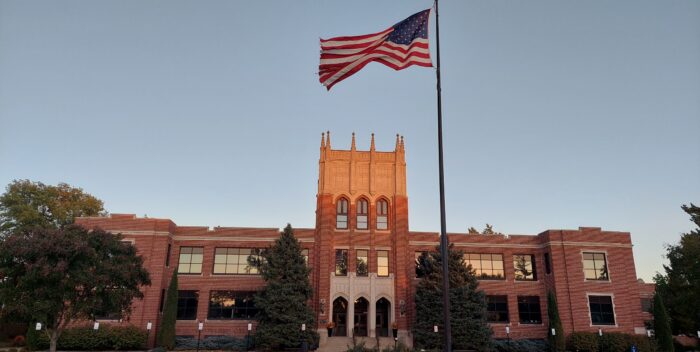One-Act play festival performance gives students practical theatre experience, brings audience to their feet
Photo credit:
By Josiah Horvath
The final performance of the One-Act Play Festival was given a standing ovation, with many audience members full of tears for its resonant themes, message and acting.
The One-Act Play Festival was held in the Borland Center’s Black Box Theatre from April 10-12. The event is part of the CTA 373 Play Production class.
Four plays were presented. “Tracks” by Peter Tarsi was directed by senior Emilee Price, “A Disappearing” by Mark D. Wyss was directed by junior Ava King and “Blind Date” by Samara Siskind was directed by sophomore April Abbett. The final play was “A Fading Street Lamp,” written and directed by sophomore Andrew Ring.
The first play concerned an antechamber for heaven, where various individuals found themselves in what seemed to be a “standard underground railroad station.” They found that they could not leave the station, and they realized that they were dead. There were two platforms, one presumably going to Heaven and the other to Hell. They disputed within themselves with no resolution about which went to Heaven and which went to Hell. The trains came and the play ended.
The second play followed a magician who mistakenly and mysteriously made a child disappear at a birthday party for another child. The parents of this other child anxiously sought to solve the mystery and to find the boy, until deciding instead to monetize the magician’s ability by offering the service of disappearing children for parents.
The third play featured a blind date wherein the man turned out to be literally blind. Despite this, their date went well, until the woman went to the restroom. The man, in his excitement at his success, used her absence to do various tricks that one would not expect a blind man to do. The woman returned just in time to see this, successfully proved that he was not actually blind, and then threw the man out.
The fourth play was about a woman named Mary, played by sophomore Madee Hudson-Knowlton whose world had collapsed and who was contemplating suicide. She had an unplanned pregnancy by her best friend, so another friend convinced her to have an abortion, despite her reservations. Her best friend confronted her and told her of his vision, of her and the baby and himself as a family full of love. When she admitted she had the abortion, he became angry at her and left. She went to her parents, and her mother attacked her viciously for her mistakes. Her father sat back idly as this happened. Mary left her family.
But Gabriel, played by senior Caleb Jalas, came to her as she considered jumping off a bridge. He talked with her, seeking to save her, and sought to show how loved she really was. Mary had a vision of all the ones she loved saying unpleasant things to her. But as she was about to jump, the vision turned instead to them saying loving things about her. Her father then found her, and her best friend and her mother came, and they all embraced her.
“Some of you may be asking ‘Who is the character Mary?’ or ‘Where did you get the inspiration for this play?’,” Ring wrote in the Director’s Note. “Well, I’ll tell you that Mary is not just one person but many people. Before I came to Concordia, I attended the University of North Dakota. There I saw every type of pain and addiction that can affect a young adult.”
The production was meant to demonstrate that even and especially in our darkest hours, Christ is with us. He quoted John 7:37, saying that those who thirst can find themselves filled in Christ.
“In moments of dark depression people can become so lost that some fully believe hurting themselves is the only option left,” he wrote. “I wrote this play to show that there is always another option. The choice of life, the purpose of Christ!”
Sophomore Ellen Klintworth came to watch her friends perform. She doesn’t see her friends in serious roles very often, so it was jarring, she said, and this made her pay more attention.
“It reminds me of just how precious life on this earth is and how there will always be something left to live for even when everything seems to go wrong,” she said. “It is also a great reminder of how we should strive to forgive others because at the end of the day we are all sinners who are forgiven by God.”
She says that the One-Act Play Festival showed how theatre can reach people’s hearts and can shine light upon different parts of the human experience.
“Within [the One-Act Play Festival], there were moments of joy, confusion, sorrow, laughter, and so many more emotions that humans feel every day,” she said. “Watching those moments happen on stage made me think about my own life and allowed me to take away a lot of lessons from the plays.”



















